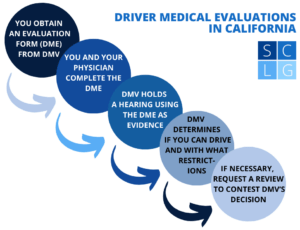
The simple answer is yes. If the Department of Motor Vehicles (DMV) learns you had a fainting spell, it will likely suspend your driver’s license. However, you do have an opportunity to contest the suspension. If you can show that the fainting episode was isolated and that you are otherwise safe to drive, your license can be reinstated.
Will the DMV suspend my driver’s license for fainting?
If the DMV learns you had a fainting spell, it will likely suspend your driver’s license. The suspension is meant to keep you off the roads until it is known whether you are safe to drive. Drivers who want to fight to keep their license can appeal the suspension. Each state has its own procedures for how to do so.
In the state of California, the California DMV has the power to suspend or revoke your driver’s license if you have a:
- lapse of consciousness disorder, or
- episodes of marked confusion.1
In determining whether you have one of these medical conditions or a seizure disorder, the DMV will consider numerous factors. These include:
- the effect of the disorder on your ability to exercise reasonable control of a motor vehicle,
- testimony from you and from others about your driving ability,
- whether the disorder is under control with or without medication,
- whether you are likely to comply with a prescribed medication,
- other medical conditions that can impact the disorder,
- your past driving record, and
- the results of a medical evaluation.2
Based on these factors, the California DMV can either:
- revoke your driver’s license,
- suspend it,
- put you on medical probation, or
- take no action.3
The DMV has to notify you, in writing, of any action that it takes. You can appeal the decision by demanding a DMV re-examination or lapse of consciousness hearing. This appeal has to happen within 14 days to trigger the administrative hearing.

What happens at the lapse of consciousness hearing?
A lapse of consciousness hearing is where you fight a license suspension or revocation for a fainting episode by showing that you can still drive safely.
These hearings happen at the DMV. A DMV hearing officer will interview you and examine the evidence. You are entitled to have a lawyer represent them at the hearing.
At the hearing, you need to show that:
- the cause for the fainting spell has been treated,
- you have no ongoing medical concerns that can cause them to faint, again, and
- you are a safe driver.
You can do this with testimony, including from friends and family members, and medical reports.
After hearing the evidence, the DMV hearing officer can:
- suspend your driver’s license,
- revoke it,
- reinstate the driver’s license and driving privileges in their entirety,
- issue a restricted permit for driving, or
- order a medical evaluation to get more information about the fainting spell.
What is medical probation?
In California, you can request to be put on medical probation after your license has been suspended for a fainting spell. To be placed on medical probation, the driver’s lapse of consciousness must be under control for at least three months.
Drivers who have not lost consciousness for three months are put on Type II medical probation. It is up to you to request Type II probation. you can do so by having your physician complete the Driver Medical Evaluation (DS 326).4 The DMV will decide whether to grant a Type II medical probation based on your:
- seizure type,
- seizure manifestation,
- medical, lifestyle, and seizure history, and
- time period since the last seizure.5
Type III medical probation is for drivers who have been seizure-free for six months, but who still carry the risk of having one, again. You have to request to be put on Type III probation, as well. This requires you to self-report your condition to the DMV regularly. In making this decision, the DMV considers:
- your medical history and your history of seizures,
- the seizure type, manifestation, and the period of time since the last episode,
- your prior non-compliance (if any),
- any incidents where you withheld information from the DMV or your doctor, and
- any inconsistent statements you made during the probationary process.6
What medical conditions cause fainting?
Fainting can be caused by numerous medical conditions, including:
- irregular heartbeats or arrhythmia,
- seizures,
- drug or alcohol impairment,
- anemia,
- hypoglycemia, or low blood sugar,
- diabetes,
- epilepsy,
- sleep disorders,
- Alzheimer’s disease and certain other mental disorders, and
- narcolepsy.
However, not all fainting spells are connected to a medical condition. Sometimes, people faint or black out from a vasovagal attack, also known as syncope. This happens when blood pressure drops drastically, cutting blood circulation to the brain.
Vasovagal attacks can be triggered by non-medical conditions, such as:
- anxiety,
- fear,
- shock,
- pain, or
- dehydration.
These types of fainting spells are unlikely to repeat in the future. Drivers who have seen their license suspended because of a vasovagal attack should strongly consider appealing the suspension.
How does the DMV hear of fainting episodes?
State DMVs can hear about a driver’s fainting episode through a variety of channels, including:
- police reports by law enforcement of a car accident that was caused by a driver’s loss of consciousness,
- tips from other drivers or members of the public, and
- reports from doctors.
California is one state that requires doctors to immediately report a patient’s lapse of consciousness or fainting spell to the DMV.7 In doing so, healthcare professionals are immune from civil or criminal liability.
Suggested Additional Reading:
Epilepsy Foundation – Driving and Epilepsy
This site from the Epilepsy Foundation provides information about seizures, epilepsy and driving regulations.
The Mayo Clinic’s syncope page provides in-depth medical information about the causes and treatment of fainting spells.
MedlinePlus provides an overview of fainting causes, symptoms, diagnosis and treatment options.
American Heart Association – Warning Signs of a Heart Attack
Since heart problems can trigger fainting, the AHA information on heart attack warning signs is useful.

